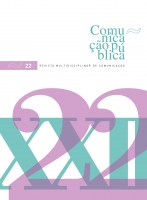Do consumo à apropriação dos MMORPGs
DOI:
https://doi.org/10.4000/cp.1359Palavras-chave:
videojogos, MMORPGs, fóruns de discussão, negociaçãoResumo
Este artigo visa identificar e caracterizar algumas das grandes mudanças que têm conduzido à necessidade de (re)pensar o papel do jogador face a videojogos como os Massively Multiplayer Online Role Playing Games (MMORPGs). Partindo da crítica ao conceito de círculo mágico e tendo por base os diversos contributos teóricos de quem concebe os MMORPGs como um espaço de negociação que aproxima produtores de consumidores (Jenkins, 2006; Steinkuehler, 2006; Klevjer, 2008; Consalvo, 2009; entre outros), pretende-se demonstrar a moldagem a que este tipo de jogos estão sujeitos, particularmente o videojogo World of Warcraft. Para tal, e tendo por base uma análise a um fórum de discussão do videojogo em questão, procura-se evidenciar as situações em que a negociação da realidade de jogo esteja presente. Por fim, apresenta-se uma proposta que sistematiza as contribuições teóricas e estrutura o processo que estará na base da moldagem dos MMORPGs.
Downloads
Referências
Achterbosch, L.; Pierce, R. e Simmons, G. (2008). Massively Multiplayer Online Role-Playing Games: The past, present and future. ACM Computers in Entertainment, 5 (4): 1-33. DOI : 10.1145/1324198.1324207 good / bad
Ang, C. S., Zaphiris, P. e Wilson, S. (2010). Computer games and sociocultural play: An activity theoretical perspective. Games and Culture, 5 (4): 354-380.
Calleja, G. (2010). Digital games and escapism. Games and Culture, 5 (4): 335-353. DOI : 10.1177/1555412009360412 good / bad
Consalvo, M. (2009). There is no magic circle. Games and Culture, 4 (4): 408-417.
Dormans, J. (2006). On the Role of the Die: A brief ludologic study of pen-and-paper roleplaying games and their rules. Game Studies, 6 (1). [Internet] Diponível em: <http://gamestudies.org/0601/articles/dormans> [Consult. a 14 de Fevereiro de 2017].
Duggan, E. (2016). Squaring the (Magic) Circle: A Brief Definition and History of Pervasive Games. In: Nijholt, A. (ed.) (2017). Playable Cities: The City as a Digital Playground. Singapore, Springer: 111-135.
Fassone, R. (2015). This is video game play: Video games, authority and metacommunication. Comunicação e Sociedade, 27: 37-52.
Frissen, V. et al. (2015). Playful Identities: The Ludification of Media Cultures. Amsterdam: Amsterdam University Press. DOI : 10.5117/9789089646392 good / bad
Glas, R. (2013). Battlefields of Negotiation: Control, Agency, and Ownership in World of Warcraf. Amsterdam: Amsterdam University Press. DOI : 10.26530/OAPEN_437366 good / bad
Pérez, H. (2012). De perfiles y personajes: evolucíon de la representación del usuário en las redes sociales y los juegos de rol. Revista de Comunicación de la SEECI, Año XV (28): 30-48.
Huizinga, J. (2003). Homo Ludens. Lisboa: Edições 70.
Jenkins, H. (2006). Convergence Culture: Where Old and New Media Colide. New York and London: New York University Press. DOI : 10.7551/mitpress/9780262036016.003.0012 good / bad
Johnson, S. (2006). Tudo o que é Mau Faz Bem. Porto: Lua de papel.
Jordan, P. et al. (2016). Selling out the magic circle: free-to-play games and developer ethics. Proceedings of 1st International Joint Conference of DiGRA and FDG, 13 (1): 1-16.
Klevjer, R. (2008). The Cultural Value of Games: Computer Games and Cultural Policy in Europe. In: Ludes. P. (ed.) (2008) Convergence and Fragmentation: Media Technology and the Information Society. Bristol, Intellect Books: 71-90.
Kücklich, J. (2009). A techno-semiotic approach to cheating in computer games: Or how I learned to stop worrying and love the machine. Games and Culture, 4 (2): 158-169. DOI : 10.1177/1555412008325486 good / bad
Lange, P. G. (2010). Learning real-life lessons from online games. Games and Culture, 6 (1): 17-37. DOI : 10.1177/1555412010377320 good / bad
Malaby, T. M. (2007). Beyond Play: A new approach to games. Games and Culture, 2 (2): 95-113.
Pais, J. M. (1986). Paradigmas sociológicos na análise da vida quotidiana. Análise Social, 22 (90): 7-57.
Postigo, H. (2007). Of Mods and Modders: Chasing down the value of fan-based digital game modifications. Games and Culture, 2 (4): 300-313.
Postigo, H. (2008). Video game appropriation through modifications: Attitudes concerning intellectual property among modders and fans. Convergence: The International Journal of Research into New Media Technologies, 14 (1): 59-74.
Prax, P. (2015). Co-Creative game design in MMORPGs. Proceedings of DiGRA 2015: Diversity of play: Games – Cultures – Identities, 12: 1-18.
Raposo, R. e Morais, N. (2010). MMORPGs e culturas de convergência. Repositório Científico do Instituto Politécnico de Viseu. Departamento de Comunicação e Arte. [Internet] Disponível em <http://repositorio.ipv.pt/handle/10400.19/500> [Consult. 23 Fevereiro de2014].
Salen, K. e Zimmerman, E. (2004). Rules of Play: Game Design Fundamentals. Londres: The MIT Press Cambridge.
Sotamaa, O. (2010). When the game is not enough: motivations and practices among computer game modding culture. Games and Culture, 5 (3): 239-255. DOI : 10.1177/1555412009359765 good / bad
Steinkuehler, C. (2006). The mangle of play. Games and Culture, 1 (3): 199-213.
Stenros, J. (2014). In Defence of a Magic Circle: The social and mental boundaries of play. Transactions of Digital Games Research Association. DiGRA, 1 (2): 147-185.
Downloads
Publicado
Edição
Secção
Licença
Direitos de Autor (c) 2017 Copyright (c) 2017 Author

Este trabalho encontra-se publicado com a Licença Internacional Creative Commons Atribuição-NãoComercial 4.0.
Os conteúdos da Comunicação Pública estão licenciados com uma licença Creative Commons - Atribuição-NãoComercial 4.0 Internacional.




